
Abu Sayyaf, officially known by the Islamic State as the Islamic State – East Asia Province, is a Jihadist militant and pirate group that followed the Wahhabi doctrine of Sunni Islam. It is based in and around Jolo and Basilan islands in the southwestern part of the Philippines, where for more than five decades, Moro groups had been engaged in an insurgency seeking to make Moro Province independent. The group is considered violent and is responsible for the Philippines' worst terrorist attack, the bombing of MV Superferry 14 in 2004, which killed 116 people. The name of the group was derived from Arabic abu, and sayyaf. As of April 2023, the group was estimated to have about 20 members, down from 1,250 in 2000. They use mostly improvised explosive devices, mortars and automatic rifles.
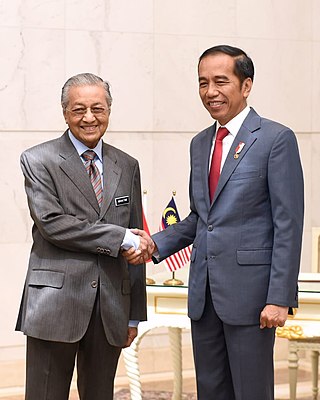
Since independence, Indonesian foreign relations have adhered to a "free and active" foreign policy, seeking to play a role in regional affairs commensurate with its size and location but avoiding involvement in conflicts among major powers. During the presidency of Sukarno, Indonesia's foreign relations were marked by engagement with other newly independent nations in Asia and Africa, as exemplified by the Bandung Conference, the subsequent foundation of the Non-Aligned Movement and a confrontational attitude towards Western powers, justified by a belief in the CONEFO and opposition to what Sukarno termed as NEKOLIM.

Jemaah Islamiyah is a Southeast Asian Islamist militant group based in Indonesia, which is dedicated to the establishment of an Islamic state in Southeast Asia. On 25 October 2002, immediately following the JI-perpetrated 2002 Bali bombings, JI was added to the UN Security Council Resolution 1267.
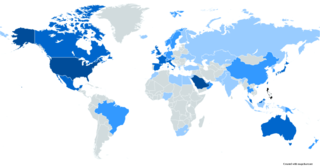
An Overseas Filipino is a person of full or partial Filipino origin who trace their ancestry back to the Philippines but are living and working outside of the country. They get jobs in countries and they move to live in countries that they get jobs in. This term generally applies to both people of Filipino ancestry and citizens abroad. As of 2019, there were over 12 million Filipinos overseas.

Filipinos are citizens or people identified with the country of the Philippines. The majority of Filipinos today are predominantly Catholic and come from various Austronesian peoples, all typically speaking Filipino, English, or other Philippine languages. Despite formerly being subject to Spanish colonialism, only around 2–4% of Filipinos are fluent in Spanish. Currently, there are more than 185 ethnolinguistic groups in the Philippines each with its own language, identity, culture, tradition, and history.

The Moro National Liberation Front is a political organization in the Philippines that was founded in 1972. It started as a splinter group of the Muslim Independence Movement. The MNLF was the leading organization among Moro separatists for about two decades beginning from the 1970s.
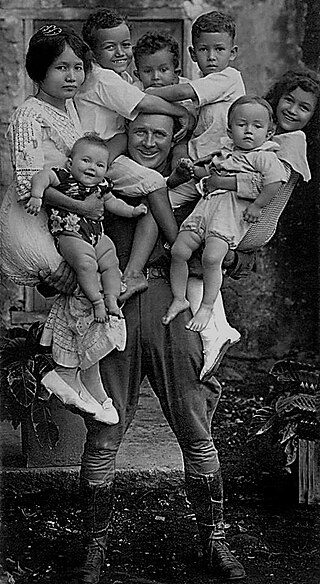
American settlement in the Philippines began during the Spanish colonial period. The period of American colonialization of the Philippines was 48 years. It began with the cession of the Philippines to the U.S. by Spain in 1898 and lasted until the U.S. recognition of Philippine independence in 1946.
Indonesians in the Philippines consist of expatriates and immigrants from Indonesia residing in the Philippines, and their descendants. Among them were many formerly stateless people, legally called Persons of Indonesian descent (PID), whom the United Nations and the governments of the two countries helped to acquire citizenship.
The Philippines has claims on territories which include the Spratly Islands, portions of North Borneo, and the Scarborough Shoal.
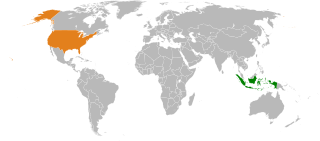
Indonesia and the United States established diplomatic relations in 1949. Relations are generally strong and close. Both are republics and recognize the strategic importance of their counterpart.

Philippines–Singapore relations are bilateral relations between the Philippines and Singapore. The Philippines has an embassy in Singapore. Singapore likewise, has an embassy in Manila. Full diplomatic relations commenced on May 16, 1969, when the Philippine consulate-general in Singapore was raised to embassy level.

Foreign relations between Australia and Philippines, cover a broad range of areas of cooperation including political, economic, development, defence, security and cultural relations between Australia and the Philippines. Australia has an embassy in Manila. The Philippines has an embassy in Canberra, consulate generals in Sydney, Melbourne, and Darwin, consulates in Brisbane, Hobart, and Perth, and an honorary consulate in Adelaide.

Indonesia and Malaysia established diplomatic relations in 1957. It is one of the most important bilateral relationships in Southeast Asia.
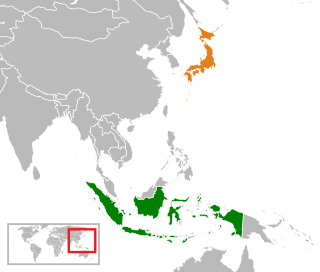
Indonesia and Japan established diplomatic relations in April 1958. Both are two Asian nations that share historical, economic, and political ties. Both nations went through a difficult period in World War II when the then Dutch East Indies was occupied by the Imperial Japanese Army for three-and-a-half years. Japan is a major trading partner for Indonesia. Japan is Indonesia's largest export partner and also a major donor of development aid to Indonesia through Japan International Cooperation Agency. Indonesia is a vital supplier of natural resources such as liquefied natural gas to Japan. Today in Indonesia, there are about 11,000 Japanese expatriates whereas in Japan, there are approximately 24,000 Indonesian nationals working and training.

Territorial disputes in the South China Sea involve conflicting island and maritime claims in the South China Sea by several sovereign states, namely the People's Republic of China (PRC), Taiwan, Brunei, Malaysia, the Philippines, Vietnam and Indonesia. The disputes involve the islands, reefs, banks, and other features of the region, including the Spratly Islands, Paracel Islands, Scarborough Shoal, and various boundaries in the Gulf of Tonkin. The waters near the Indonesian Natuna Islands, which some regard as geographically part of the South China Sea, are disputed as well.

Anti-Filipino sentiment refers to the general dislike or hatred towards the Philippines, Filipinos or Filipino culture. This can come in the form of direct slurs or persecution, in the form of connoted microaggressions, or depictions of the Philippines or the Filipino people as being inferior in some form psychologically, culturally or physically.
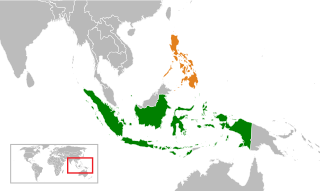
Indonesia–Philippine relations are the bilateral relations between Indonesia and the Philippines. The two countries established diplomatic relations on November 24, 1949. Since then, both countries enjoy cordial bilateral relationship in spirit of kinship. The two countries are considered allies and it is considered as one of the most important bilateral relationships in ASEAN. Both countries have established embassies in each capitals, Indonesia has their embassy in Manila and consulate general in Davao City, while the Philippines has their embassy in Jakarta and consulate general in Manado. High rank stately visits have been conducted for years.
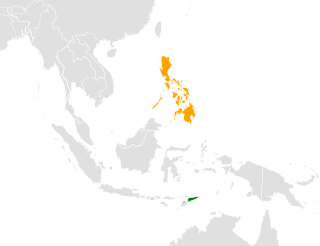
East Timor–Philippines relations refer to foreign relations between East Timor and the Philippines. The Philippines was actively involved in the United Nations peacekeeping forces in East Timor during its move towards independence. When several nations recognized East Timor's sovereignty, the Philippines began official diplomatic relations between the two governments with the establishment of an embassy in Dili and East Timor established its embassy in Pasig.
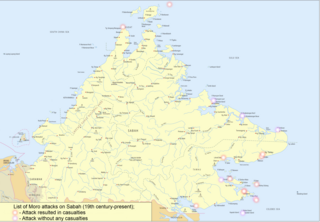
The cross border attacks in Sabah are a series of cross border terrorist attacks perpetrated by Moro pirates from Mindanao, Philippines, in the state of Sabah, Malaysia, that began even before the British colonial period. Many civilians have died or suffered during these incidents, causing an increase in anti-Filipino sentiment among the native peoples of Sabah, especially after major attacks in 1985, 2000 and 2013. The attacks were more intense during the presidential terms of Diosdado Macapagal and Ferdinand Marcos, who supported irredentist claims to include eastern Sabah as part of the Philippines territory. In addition, recent infiltration and attacks by militants as well as uncontrolled human migration from Mindanao to Sabah has led to more unease sentiments among the local residents of Sabah, with around 78% of prison inmates that were caught in the state due to involvement in criminal activities and lawlessness issues mainly originating from the southern Philippines.

In the New York metropolitan area, Filipinos constitute one of the largest diasporas in the Western Hemisphere. By 2014 Census estimates, the New York City-Northern New Jersey-Long Island, NY-NJ-CT-PA Combined Statistical Area was home to 262,375 Filipino Americans, 221,612 (84.5%) of them uniracial Filipinos.



















